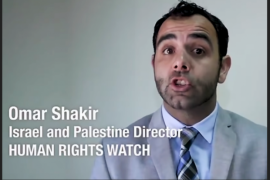Readers will probably remember that a few days ago we commented on Wyre Davies’ grossly historically incorrect claim that rockets fired from Gaza at Israeli civilians are a result of the partial blockade on the Gaza Strip – rather than the other way round.
Has that error since been corrected?
No: in fact the report concerned was expanded and upgraded to the category of ‘analysis’.
Davies’ expanded article is, if anything, even more egregious than the original report and is far more occupied with promoting a narrative than with anything which could be remotely described as fact-based analysis.
“You can feel the palpable lifting of that burden among Gazan colleagues. This is such a small densely populated stretch of land that few areas have escaped the impact – direct or indirect – of Israeli bombing in recent days.
In the BBC Gaza office, that feeling was most tangibly felt on the first day of this conflict when Omar, the 11-month-old son of our cameraman Jihad Misharawi, was killed when a missile hit his home. It was a pointless, terrible tragedy that deeply affected Jihad’s colleagues who live and work here in these testing conditions.
What has shocked me most over the last eight days – during which I have reported exclusively from Gaza, with BBC colleagues complementing in Israel – is the appallingly high number of children killed and injured.”
In fact, according to figures released by the IDF, of a total of 165 people killed in Gaza during the operation, 93 belonged to one of seven different terrorist groups. Sixty eight civilians died, of those 25 children and 9 youths. That civilian to combatant ratio is one of the lowest known, reflecting the considerable efforts made to avoid civilian casualties wherever possible.
Like his colleague Jon Donnison, Davies avoids the subject of children or other civilians in Gaza killed or injured as a result of at least 152 known instances of short-falls of terrorist-launched missiles. He and his esteemed colleagues decline, for example, to call to the attention of audiences the fact that four year-old Mahmoud Sadallah – who the BBC, like many other media outlets, described as having been killed in an Israeli air strike – actually died as a result of a terrorist’s rocket.
Neither does Davies’ ‘analysis’ include the fact that Hamas and other terrorist organisations acting within the Gaza Strip deliberately embed rocket-launchers, weapons storage facilities and terror operatives deep within built up residential areas in order to co-opt the civilian population as human shields.
For Davies – as with the rest of the BBC’s team in Gaza – the only story worth telling is one in which a Palestinian child is killed in an Israeli air strike – whether that assertion is verifiable or not.
The ‘analysis’ continues – recycling Davies’ previously made historically incorrect argument:
“If the events of the last week (and 2006 and 2008-9) are not to be repeated, a lasting ceasefire is paramount and a permanent solution to improving the daily lives of more the one and a half million Gazans must be put into place.
It is a destructive cycle.
After previous conflicts, it went something like this: Gaza would be allowed to rebuild its institutions and infrastructure; but, with time, as people became increasingly frustrated with the Israeli blockade, Palestinian militants would fire more and more rockets into Israel; Israel would respond with overwhelming military force, and much of what had been built up was destroyed.”
Obviously, any BBC reporter supposedly trying to inform audiences about the Arab-Israeli conflict is hampered by the fact that the BBC’s Editorial Guidelines discourage (to put it mildly) the use of the word ‘terror’ in order to avoid “value judgements”.
Hence, it is difficult to explain that Hamas is a terrorist organization which seeks the expulsion of Jews from the whole of Israel, and why Hamas and its terror colleagues are still firing rockets at Israeli civilians deep inside the ‘green line’ from a place where virtually no Israeli civilian has set foot for the past seven and a quarter years.
Thus, instead of factually accurate analysis, audiences have to make do with ‘contextualised’ interpretations featuring red herrings such as “the Israeli blockade”, “a lasting ceasefire” and “a permanent solution”.
Such analysis has to deliberately ignore the fact that the Gaza Strip has a border with Egypt, through which it could theoretically import and export at will in order to develop its economy – had it not seriously compromised that by annoying its neighbours to the south by making its main imports weapons and its main export terror.
And, it seems, such analysis must also describe an almost daily twelve year long stream of war crimes – the deliberate targeting of a civilian population with mortars, rockets and missiles – as though it were something on a par with throwing litter on the street.
“It is not normal, not acceptable, that rocket fire resumes on southern Israel, and the consequences must be crystal-clear for any militants who grow frustrated with a lack of political progress in coming months or years.”
It must take quite some doing to convince oneself that “militants” – be they members of Hamas, Fatah (which also lays claim to having fired rockets at Israeli civilians last week) or any other faction – are so “frustrated” by a “lack of political progress” that they have no choice but to turn to rocket fire.
BBC reporters’ ‘analysis’ can contribute nothing to his audiences’ understanding of the Middle East as long as they are based on distortions of history and until journalists cease projecting and begin to actually listen to the people about whom they write.






